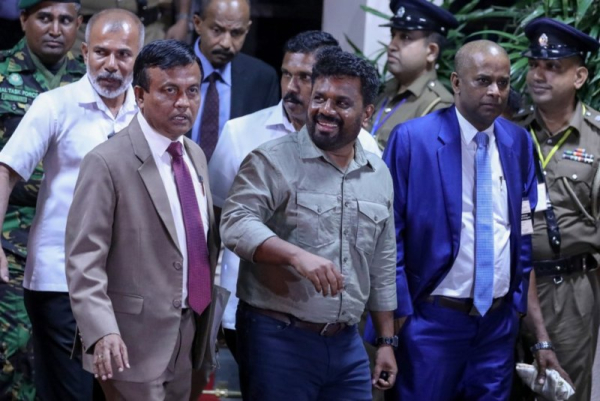
1 of 3 | Anura Kumara Dissanayake (center) appears Sunday before the media in Colombo, Sri Lanka, after the announcement of his victory in Sri Lanka’s presidential election. Photo by Chamila Karunarathne/EFE/EPA
Anura Kumara Dissanayake, a Marxist, has won Sri Lanka’s presidential election following a historic second ballot count.
“This victory belongs to us all,” Dissanayake, 55, told Sri Lankans in a message on the X on Sunday. Advertisement
Dissanayake got 42.31% of the vote compared with his closest rival, opposition leader Sajith Premadasa, who garnered 32.76%. No candidate won more than 50% of the vote. Dissanayake had won a total of 5,740,179 votes to Premadasa’s 4,530,902, the country’s election commission said.
Sri Lanka uses ranked choice voting so if no candidate gets more than 50%, a second round of counting takes place and the candidate with the highest vote total is declared the winner.
Incumbent President Ranil Wickremesinghe ran for re-election as an independent candidate. He was the first sitting president to run for re-election since Mahinda Rajapaksa sought re-election in 2015.
“I successfully completed the responsibility that history put on my shoulders. I was able to rescue my motherland from bankruptcy within a short period of two years,” Wickremesinghe said after Dissanayake was declared the winner. Advertisement
Dissanayake’s election is in line with the political climate in Sri Lanka, which leans to the left. During his election campaign, he promised voters good governance and that he would be tough on corruption.
This was Sri Lanka’s first election since 2022 when protestors threw out Gotabaya Rajapaksa following a devastating economic collapse.
“The dream we have nurtured for centuries is finally coming true. This achievement is not the result of any single person’s work, but the collective effort of hundreds of thousands of you,” Dissanayake continued. “Your commitment has brought us this far, and for that, I am deeply grateful. This victory belongs to all of us.”
Dissanayake has said he will develop the manufacturing, agriculture and IT sectors, and has promised to continue a deal made with the International Monetary Fund to help Sri Lanka recover from its economic crisis while lessening the impact of austerity measures on the country’s poorest people.
Seventy-six percent of Sri Lanka’s 17 million voters cast ballots, election officials said.